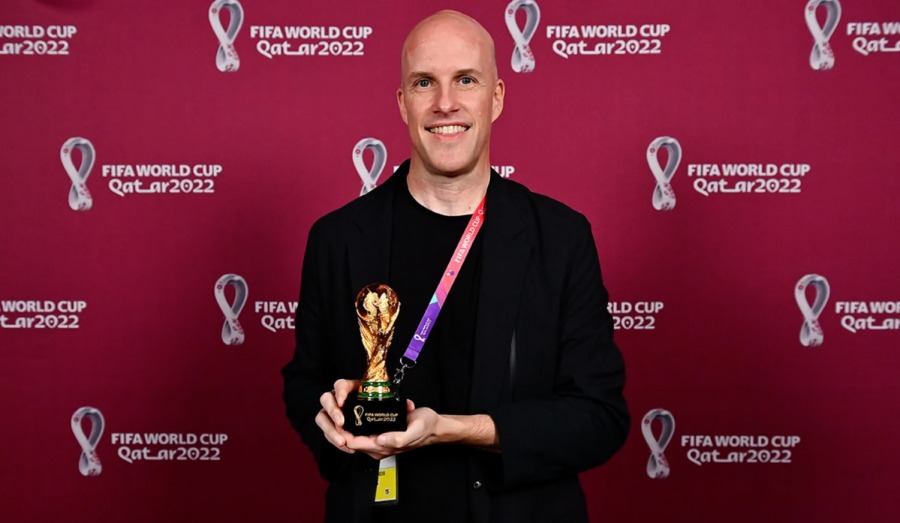Sports Journalist Grant Wahl Dies at 49
Soccer journalist Grant Wahl died Saturday, Dec. 10 in Doha, Qatar while covering the World Cup.
PHOTO | Brendan Moran – FIFA/FIFA via Getty Images
Grant Wahl stands with a World Cup replica trophy Tuesday, Nov. 29 during the FIFA Journalist on the Podium ceremony in Doha, Qatar.
American sports journalist Grant Wahl died Saturday, Dec. 10 at Hamad General Hospital in Doha, Qatar. Wahl, who was 49, was covering the FIFA World Cup, and his death has prompted various emotions and conspiracies across the internet.
Wahl collapsed while covering the quarterfinal match between Netherlands and Argentina on Friday. After several witnesses called for help, paramedics treated him on-site for around 20 minutes. Before switching to Substack, the Kansas native was a writer and analyst for Sports Illustrated for over two decades.
He published a newsletter Dec. 5 and a podcast Dec. 6, in both of which he noted feeling ill.
“My body finally broke down on me. Three weeks of little sleep, high stress and lots of work can do that to you. What had been a cold over the last 10 days turned into something more severe on the night of the USA-Netherlands game, and I could feel my upper chest take on a new level of pressure and discomfort,” he wrote on Substack. “I didn’t have Covid (I test regularly here), but I went into the medical clinic at the main media center today, and they said I probably have bronchitis. They gave me a course of antibiotics and some heavy-duty cough syrup, and I’m already feeling a bit better just a few hours later. But still: No bueno.”
He then collapsed at the match Friday, was given medical treatment before being transferred to the hospital.
“This was towards the end of extra time in the match. Suddenly, colleagues up to my left started shouting for medical assistance. Obviously, someone had collapsed. Because the chairs are freestanding, people were able to move the chairs, so it’s possible to create a little bit of space around him,” World Soccer Magazine writer Keir Radnedge said in an interview with CNN.
His death was confirmed by several sources, and US Soccer released a statement shortly after.
In the days after his death, journalists and other prominent figures in the soccer world shared tributes. Also following his death was an emotional video via Instagram from his brother, Eric Wahl, in which he shared his belief that his brother was killed.
“My brother was healthy. He told me he received death threats. I do not believe my brother just died. I believe he was killed,” Eric Wahl said in the video that is no longer public.
Many on social media shared this theory, and believed that Wahl’s outspokenness against human rights abuses and justice issues in Qatar throughout the tournament may have prompted foul play.
In the early stages of the tournament, Wahl was detained by stadium officials upon arrival for wearing a shirt with a soccer ball inside of a rainbow. In Qatar, homosexuality is illegal. He detailed the incident on his Substack, where he wrote that security guards held him for several minutes and ordered him to remove his shirt.
Wahl also wrote a critical piece of Qatari World Cup organizers, calling out their ‘apathy’ over migrant worker deaths. He specifically called out the CEO of the Qatari Supreme Committee, Nasser Al-Khater, who was interviewed by BBC over the deaths.
“We’re in the middle of a World Cup, and we have a successful World Cup. And this is something that you want to talk about right now?” Al-Khater said when asked about the worker’s death. “I mean, death is a natural part of life, whether it’s at work, whether it’s in your sleep. Of course, a worker died. Our condolences go to his family. However, it’s strange that this is something that you wanted to focus on as your first question.”
Contrary to his initial beliefs, Eric Wahl tweeted Tuesday morning that he “no longer suspects foul play,” and posts on social media pointed to various causes, including his developing illness, continued suspicion of Qatari officials and even his vaccination status, as well.
In light of all of the theories, Wednesday, Dec. 14, Wahl’s wife, infectious disease physician Céline Gounder, shared that he died of an undetected aortic aneurysm.
“Grant died from the rupture of a slowly growing, undetected ascending aortic aneurysm with hemopericardium,” she wrote on Substack. “The chest pressure he experienced shortly before his death may have represented the initial symptoms. No amount of CPR or shocks would have saved him. His death was unrelated to COVID. His death was unrelated to vaccination status. There was nothing nefarious about his death.”
Thoracic aortic aneurysms are a weakening of the blood vessel, and as they enlarge, they can cause symptoms such as coughing, chest pain and shortness of breath, which likely prompted himself and his physicians to assume a cold or bronchitis.
Gounder expressed her gratitude towards the domestic and international organizations that helped with the transportation of the body from Qatar to New York. She wrote a tribute on Wahl’s Substack newsletter highlighting his career, advocacy, character and memories. A celebration of life was held Wednesday, Dec. 21 at The Times Center in New York City.
“While the world knew Grant as a great journalist, we knew him as a man who approached the world with openness and love,” Gounder wrote. “Grant was an incredibly empathetic, dedicated, and loving husband, brother, uncle, and son who was our greatest teammate and fan. We will forever cherish the gift of his life; to share his company was our greatest love and source of joy.”



